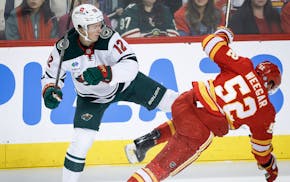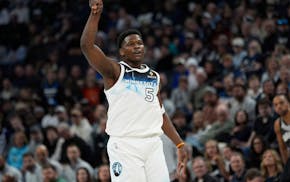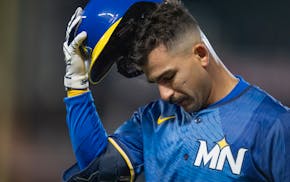For just $10, University of Minnesota basketball player Parker Fox will sell you a personalized video shout-out. He has started endorsing local businesses on his Instagram. The 6-foot-8 power forward is even making deals with campus restaurants to promote his name — the "Parker Fox loaded tater tots" will soon be on the menu at Sally's Saloon.
Fox said he has raked in nearly $10,000 since July through more than a dozen such deals. The Gophers men's basketball player is among several dozen student athletes at the U who have cashed in on their brand since the NCAA began allowing college athletes to profit off their name, image and likeness (NIL).
"It's helped my personal savings a lot," said Parker, who has a bachelor's degree in sports marketing and is now pursuing a master's in sports management. "One day the basketball is going to stop bouncing and I've got to have a little money in my bank account."
While college sports superstars such as U wrestler Gable Steveson and University of Connecticut women's basketball player Paige Bueckers have made headlines with top-dollar endorsement deals, athletes with less name recognition are also making money through everything from social media influencing to autograph signings, modeling and sports camps. It's the start of a new era for college athletes, who can make money to pay their living expenses and build savings while also learning valuable marketing skills that can be carried into their careers.
The NCAA's landmark July 1 policy allows college athletes to make money off a variety of services and activities, so long as they report any deals to their schools.
At the U, Gophers athletes signed a total of 150 NIL deals between July 1 and Nov. 8, according to data obtained by the Star Tribune. Football players accounted for about a third of the deals.
Steveson, the U wrestler and Olympic gold medalist, signed the most lucrative deal of any Golden Gopher. He will join the WWE, the popular pro wrestling circuit, full time after he finishes his senior wrestling season for Minnesota. He will be featured in WWE commercials and profit off his name, image and likeness during his final season at the U.
The university has been supportive of its athletes' ambitions. Gophers football coach P.J. Fleck described the new NIL rules as "tremendous," noting the Twin Cities has "businesses galore" for players to partner with. Men's basketball coach Ben Johnson said he's "all for it."
Colleges cannot help athletes make deals, said U senior associate athletic director Mike Wierzbicki. But the university's athletics department has brought in a consultant to teach student athletes about contracts, financial literacy and other topics that will help them navigate deals.
The department is providing athletes with professional photos to include in their online profiles, Wierzbicki said, and it's tagging athletes in posts from the university's social media accounts to boost their name recognition.
The University of St. Thomas is also helping its athletes build their social media profiles and better understand NIL rules.
"It really is name recognition and social following," Wierzbicki said. "Just because you're the starting point guard or the starting quarterback … doesn't necessarily mean that you're the most marketable student athlete."
Emma Carpenter, a U women's golfer who has 22,000 Instagram followers, said she signed her first name, image and likeness deal in August. She promotes a golf rangefinder, which helps estimate shot distance, from the company Pinned Golf on her Instagram and makes commission on sales.
But Carpenter said she is cautious of taking on too many deals, since some companies might try to "take advantage of the naiveté of a lot of young athletes." She also does not want to flood her social media account with sponsored posts. Carpenter is studying broadcast journalism in hopes of becoming a sportscaster and wants her social media to remain authentic.
"I'm more looking to parlay an image that's going to last and move into a career into the future," she said.
Makayla Pahl, a goaltender on the Gophers women's hockey team, said she hired a management team to help look for deals while she focuses on her sport and school. She has signed one deal so far with Next College Student Athlete, an organization that connects middle school and high school athletes with college coaches. She will be paid $1,000 to make three short TikTok videos promoting the company.
"This is huge for me," Pahl said. "My family, we didn't grow up with a lot of money."
Pahl noted that most student athletes only have time to work jobs over the summer because their sports and classes keep them busy the rest of the year.
"The scholarship we're getting is paying for rent, and outside of that, we don't have any more money," Pahl said of student athletes. "Being able to get paid for our name, image and likeness is huge and honestly builds you up for the rest of your life."
U men's hockey forward Sammy Walker seized the NIL opportunity to do something he always dreamed of: start his own youth hockey camp.
More than 60 kids attended the first Sammy Walker Hockey Camp in Richfield in August, Walker said. They ran through drills, games and team-building exercises and had fun off the ice, too, playing dodgeball, kickball and going to a nearby waterpark. Registration has already opened for next year's camp.
"I don't really care for trying to sign the big endorsement deals," Walker said. "I just think this is a way to just go have fun and give back to the community and let kids go to a camp that hopefully they're going to have a blast at."
Luke Loewe, a guard on the men's basketball team, is still on the hunt for the right deal — but not necessarily for something basketball-related. Loewe is an aspiring pro fisherman and said he would like to promote fishing companies as a Big Ten athlete.
"I'd love to combine the two, my love of bass fishing and basketball," Loewe said. "If there's any marine shops or boat stores that want to do an NIL deal with me, I'm trying to buy a boat for the fishing season in the spring," he laughed.
Athliance CEO Peter Schoenthal believes NIL deals will benefit athletes long term. But he is urging colleges, businesses and players to be cautious since it's not clear which deals are allowed and which could violate NCAA policies, or even state laws. The NCAA has asked Congress to create federal legislation regulating the deals.
"This is a brand new space. We are five months into something that is going to be here forever, and that makes it the wild west," said Schoenthal, whose company designed software that helps schools vet their athletes' deals. "You don't want to see [athletes] getting taken advantage of where they're led down a path where they're entering deals that violate the rules on a federal, state or university level for someone else's gain."
Because at the end of the day, Schoenthal said, "if someone messes up, the only person who loses their eligibility is the student athlete."
Will Bueckers have same impact on WNBA as Clark?

Wild crash against Flames, shunt their playoff prospects into shaky territory

Wolves rout Nets but lose Edwards for Sunday's regular-season finale
